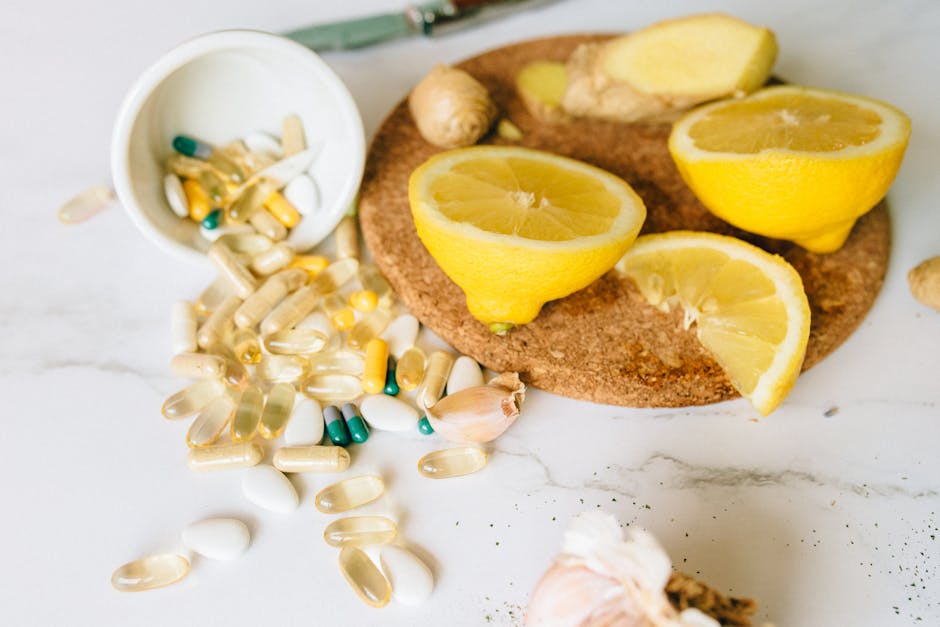
Top Tips for Effective Blood Sugar Support
Maintaining balanced blood sugar levels is crucial for overall health and wellness. Blood sugar, or glucose, is the body's primary source of energy, but when levels become too high or too low, it can lead to serious health issues. Understanding the importance of blood sugar support is the first step towards a healthier lifestyle.
Effective blood sugar support involves a combination of diet, exercise, and natural supplements. By making informed choices about what you eat, how you move, and the supplements you take, you can help your body maintain stable blood sugar levels. This not only helps in preventing conditions like diabetes but also promotes overall well-being, including better energy levels and mood stability.
At MC Herbs, we are committed to educating our customers about the best practices for managing their health naturally. With over 45 years of experience through Chupp's Herb Company, our mission is to provide you with the knowledge and tools you need to support your blood sugar levels effectively. Follow us on social media for more tips and insights on health and wellness at mcherbs.co.
Understanding Blood Sugar Levels

Understanding blood sugar levels is a fundamental aspect of managing your health. Blood sugar levels refer to the concentration of glucose in your bloodstream at any given time. These levels can fluctuate throughout the day based on various factors, such as your diet, physical activity, and even stress levels.
Normal blood sugar levels typically range between 70 and 100 milligrams per deciliter (mg/dL) when fasting, and should be less than 140 mg/dL two hours after eating. However, these values can vary slightly depending on individual health conditions and guidelines set by healthcare professionals. Monitoring your blood sugar levels regularly can help you understand how your body responds to different foods and activities, allowing you to make more informed choices.
High blood sugar levels, known as hyperglycemia, can lead to serious health complications if left unmanaged, including diabetes, heart disease, and neuropathy. Conversely, low blood sugar levels, or hypoglycemia, can cause symptoms like dizziness, confusion, and even fainting. This makes it essential to maintain balanced blood sugar levels to support overall health and prevent potential complications.
In the next sections, we will delve deeper into practical tips and strategies for effective blood sugar support. By understanding and monitoring your blood sugar levels, you'll be better equipped to maintain your health and well-being.
Importance of a Balanced Diet

A balanced diet plays a crucial role in maintaining stable blood sugar levels and overall health. Consuming a variety of foods that provide essential nutrients helps the body function optimally and supports effective blood sugar management. A diet rich in whole grains, lean proteins, healthy fats, and plenty of fruits and vegetables can significantly impact your blood sugar levels.
Carbohydrates, for instance, have a direct effect on blood sugar. Choosing complex carbohydrates like whole grains, legumes, and vegetables over simple sugars and processed foods can help prevent spikes in blood sugar levels. Complex carbs are digested more slowly, leading to a gradual release of glucose into the bloodstream, which helps maintain stable blood sugar levels.
Incorporating lean proteins, such as chicken, fish, tofu, and legumes, into your meals can also help manage blood sugar levels. Proteins have minimal impact on blood sugar and can promote feelings of fullness, reducing the likelihood of overeating or consuming high-sugar foods.
Healthy fats, like those found in avocados, nuts, seeds, and olive oil, are another important component of a balanced diet. These fats can help slow down the absorption of carbohydrates and prevent rapid spikes in blood sugar levels. Additionally, they provide essential fatty acids that support brain health and reduce inflammation.
Lastly, don't forget about fiber. Fiber-rich foods, such as fruits, vegetables, and whole grains, can help regulate blood sugar by slowing the digestion and absorption of sugar. This not only aids in maintaining stable blood sugar levels but also supports digestive health.
By prioritizing a balanced diet, you can effectively support your blood sugar levels and overall well-being. Stay tuned as we explore more strategies for blood sugar support in the following sections.
Role of Physical Activity

Physical activity is a vital component in managing blood sugar levels and promoting overall health. Engaging in regular exercise helps the body utilize glucose more efficiently and can lead to improved insulin sensitivity, which is essential for maintaining balanced blood sugar levels.
When you exercise, your muscles use glucose for energy, which can help lower blood sugar levels. This effect can last for hours or even days after a workout, making physical activity a powerful tool for blood sugar management. Activities such as walking, jogging, cycling, strength training, and yoga can all contribute to better blood sugar control.
**Aerobic exercises** like walking, running, or swimming increase your heart rate and improve cardiovascular health. These activities help the body use insulin more effectively, allowing cells to absorb glucose more efficiently. Aim for at least 150 minutes of moderate aerobic exercise per week for optimal benefits.
**Resistance training**, including weight lifting and bodyweight exercises, can also have a positive impact on blood sugar levels. Building muscle mass helps increase the number of glucose receptors in the body, making it easier for cells to take in glucose from the bloodstream. Incorporate resistance training into your routine at least two to three times per week.
**Flexibility and balance exercises**, such as yoga and tai chi, not only improve physical strength and coordination but also help reduce stress. Stress can negatively impact blood sugar levels, so incorporating activities that promote relaxation and mental well-being is equally important.
It's essential to find physical activities that you enjoy and can maintain consistently. Consistency is key when it comes to reaping the benefits of exercise for blood sugar management. As you integrate more physical activity into your daily routine, you'll likely notice improvements in your blood sugar levels, energy, and overall health.
Stay with us as we continue to explore more effective strategies for blood sugar support in the upcoming sections.
Natural Supplements for Blood Sugar
Natural supplements can play a significant role in supporting blood sugar levels and enhancing overall metabolic health. While they are not a substitute for a balanced diet and regular exercise, certain supplements can complement these efforts by providing additional nutrients and bioactive compounds.
**Chromium** is a trace mineral that has been shown to improve insulin sensitivity and help regulate blood sugar levels. It works by enhancing the action of insulin, making it easier for cells to absorb glucose. Foods like broccoli, grape juice, and whole grains are good sources, but supplements can provide a more concentrated dose.
**Berberine** is a plant compound found in several herbs, including goldenseal and barberry. Research indicates that berberine can help lower blood sugar levels by increasing insulin sensitivity and reducing glucose production in the liver. It's often considered one of the most effective natural supplements for blood sugar management.
**Cinnamon** is not only a popular spice but also a potent supplement for blood sugar support. Studies suggest that cinnamon can help lower fasting blood sugar levels and improve insulin sensitivity. Incorporating cinnamon into your diet or taking it as a supplement can provide these benefits.
**Alpha-lipoic acid (ALA)** is an antioxidant that helps reduce oxidative stress, which is often elevated in individuals with high blood sugar levels. ALA has been found to improve insulin sensitivity and lower blood sugar levels, making it a valuable supplement for metabolic health.
**Magnesium** is another essential mineral for blood sugar regulation. Magnesium deficiency is common among people with insulin resistance, and supplementing with magnesium can help improve insulin sensitivity and blood sugar control. Green leafy vegetables, nuts, and seeds are good dietary sources, but supplements can ensure adequate intake.
**Fenugreek** is a herb that has been traditionally used to manage blood sugar levels. Its seeds contain soluble fiber, which can help slow the absorption of carbohydrates and improve blood sugar control. Fenugreek supplements are a convenient way to incorporate this herb into your regimen.
Before starting any new supplement, it's essential to consult with a healthcare provider, especially if you have existing health conditions or are taking other medications. Natural supplements can be a valuable part of a comprehensive approach to blood sugar management, complementing dietary changes and physical activity.
Continue reading to discover more tips and strategies for effective blood sugar support in the next section.
Lifestyle Changes for Better Management

Making lifestyle changes is a cornerstone for managing blood sugar levels effectively. By integrating these changes into your daily routine, you can significantly improve your metabolic health and reduce the risk of complications associated with imbalanced blood sugar levels.
**Regular Exercise** is one of the most effective ways to enhance insulin sensitivity and manage blood sugar levels. Activities such as brisk walking, cycling, swimming, and strength training can help your muscles use glucose more efficiently. Aim for at least 150 minutes of moderate-intensity exercise per week.
**Balanced Diet**: Focus on a balanced diet rich in whole foods, including plenty of vegetables, fruits, lean proteins, and healthy fats. Limit your intake of processed foods, sugary beverages, and refined carbohydrates, which can cause rapid spikes in blood sugar levels. Incorporating fiber-rich foods such as beans, lentils, and whole grains can help stabilize blood sugar.
**Stress Management**: Chronic stress can negatively impact blood sugar levels by increasing the production of cortisol, a stress hormone that can cause glucose levels to rise. Practices such as mindfulness meditation, deep breathing exercises, and yoga can help manage stress and improve overall well-being.
**Adequate Sleep**: Quality sleep is crucial for maintaining healthy blood sugar levels. Poor sleep can lead to increased insulin resistance and higher blood sugar levels. Aim for 7-9 hours of sleep per night and establish a consistent sleep routine to improve your sleep quality.
**Hydration**: Staying well-hydrated is essential for blood sugar management. Water helps the kidneys flush out excess glucose through urine. Aim to drink at least 8 cups of water per day and avoid sugary drinks that can cause spikes in blood sugar levels.
**Regular Monitoring**: Keeping track of your blood sugar levels can provide valuable insights into how your lifestyle choices affect your health. Regular monitoring can help you make informed decisions about your diet, exercise, and other habits to maintain optimal blood sugar levels.
Integrating these lifestyle changes can help you achieve better blood sugar control and improve your overall health. Remember, consistency is key, and even small changes can make a significant difference over time.
For more health tips and wellness insights, follow us on social media and stay updated with the latest information.
